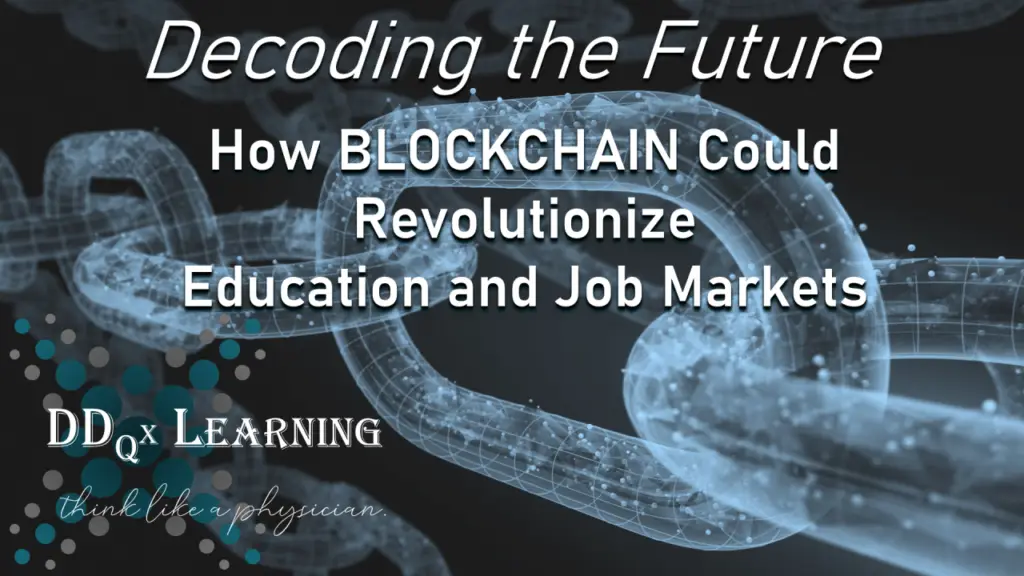
Decoding the Future: How Blockchain Could Revolutionize Education
Blockchain… WTF is it exactly?!?
Like most of you, when I first heard about blockchain technology, originally developed for cryptocurrencies like Bitcoin, I had no clue how it worked or why anyone would want to bother with it. While I’m still not sold on using it as a foundation to currency, I’ve come around on its potential applications in education.
Put simply, blockchain has the potential to dramatically reshape the education sector, particularly in the way educational credentials are issued and verified.
Let’s think of blockchain technology as a gossip-loving town where everyone knows everyone.
In this town, when two people make a deal, it’s like they’re shouting it out in the town square. They announce what’s being exchanged, who’s involved, and all the important details. Then, everyone in town hears the deal and writes it down in their personal notebooks.
Now, the town folks don’t trust each other enough to rely on just one person’s notebook. What if that person makes a mistake, loses their notebook, or decides to get crafty and alter something? So, instead, they all keep their own copies. Whenever a new deal is announced, everyone updates their notebooks.
So, you’ve got an entire town (the network) keeping the same information (the ledger) in their notebooks (individual computers). If someone tries to cheat and shout out a false deal, the town folks can cross-check their notebooks and call out the lie. Similarly, if someone loses their notebook or makes an error, there are countless backups.
That’s essentially blockchain – a big, gossip-loving, truth-checking town, keeping track of all deals (or transactions) ever made. Just replace the town folks with computers, the notebooks with digital databases, and the town square with the internet!
In its simplest form, a blockchain is a decentralized, digital ledger of transactions across many computers. Once a record has been added to the chain, it is extremely difficult to change, making the technology inherently secure and resistant to fraud.
That’s all fine and dandy, but you may still be wondering what any of that has to do with education. Let’s explore just a few of the potential uses:
- Digital Certification and Verification: With blockchain, educational institutions could issue digital diplomas and certificates, permanently and immutably stored on a blockchain. This would make the process of credential verification much quicker and more efficient for employers or other universities. It eliminates the need for intermediaries, reduces the potential for fraudulent claims, and could even streamline the process of transferring credits between institutions.
- Lifelong Learning Passport: Blockchain could facilitate the creation of a ‘lifelong learning passport’, a comprehensive record of a person’s learning and skills acquisitions throughout their life, not just from formal education. This could include online courses, professional development, badges, micro-credentials, and even informal learning experiences. This would provide a fuller picture of a person’s abilities and skills, which could be particularly valuable in fast-changing industries where continuous learning is crucial.
- Autonomous and Personalized Learning: With blockchain’s ability to securely store and share personal data, it could be used to support personalized learning paths. Students could have more control over their learning, choosing the subjects and skills they wish to pursue based on their career goals or personal interests. Blockchain would then provide a secure and verifiable record of their achievements.
- Global Mobility and Equality: Blockchain could help equalize opportunities by enabling global recognition of qualifications, making it easier for individuals to study or work abroad. It also offers the potential to recognize learning and credentials from less formal settings or from institutions in developing countries that might be overlooked or undervalued in the current system.
The implications of these advancements are far-reaching and could have both positive impacts as well as significant drawbacks:
- Employment Market: A more comprehensive and verifiable record of an individual’s skills and learning could lead to more efficient job matching. Employers could have more trust in the qualifications of their potential hires, and individuals could better showcase their full range of skills and experiences.
- Education Providers: Universities and schools would need to adapt to this new way of recording and verifying learning. This might encourage a shift towards more modular and flexible learning, with institutions providing shorter courses or modules that can be taken throughout life, rather than in a single period of full-time study.
- Data Privacy: While blockchain could provide a secure way of storing personal learning records, it also raises questions about data privacy and control. There would need to be clear regulations about who can access an individual’s learning record and how this data can be used.
I hope you found this a useful breakdown of how blockchain works as well as gathered a better understanding of the considerable potential for blockchain to disrupt the current education system. By enabling secure, verifiable, and lifelong records of learning, blockchain could transform the way we recognize and value education and skills, with profound implications for individuals, education providers, and employers.
